EDITOR’S NOTE: Seattle-based writer and NCS reader Gemma Alexander happens to be a fan and student of all things Icelandic. After months of planning, Gemma journeyed to Iceland in late October to see the country, and she timed her visit to coincide with the Iceland Airwaves festival, which includes over 420 bands playing all over Reykjavík for five days, plus 400 more unofficial, off-venue performances.
Though Airwaves may be best known as an indie pop fest, it also includes performances by an impressive array of Icelandic metal bands. Knowing of NCS’ own appreciation for Icelandic metal and the attention we’ve paid to Icelandic bands this year, Gemma offered to arrange interviews with several of them. We previously posted her interview of Angist, and today we’re privileged to give you Gemma’s interview of two of the members of Beneath, whose killer debut album was released earlier this year by Unique Leader (featured at NCS here).
Gemma has also been blogging about her entire Icelandic vacation — and it’s wonderful. Do yourself a favor and check it out HERE. And now, here’s Gemma’s interview — with some Beneath death metal at the end.
********
Beneath is fairly new, but the musicians behind the name are some of the heaviest hitters in Icelandic metal. Fronted by Gísli Sigmundsson of the historic Sororicide, with Unnar Sigurðsson of Ophidian I fame on guitar, and with drums provided by Atrum’s Ragnar Sverisson, Beneath came out swinging in 2009, winning Iceland’s first Wacken Metal Battle. An EP followed in 2010, with their first full-length, Enslaved by Fear, released this July. Needless to say, all of the usual metaphors involving blunt force trauma apply.
I was fortunate to meet with Gísli and Ragnar at Dillon Whiskey Bar in Reykjavík before the Iceland Airwaves festival. We talked about the band, their music, and the state of Icelandic heavy metal.
NCS: It seems like Icelandic metal is getting a higher profile.
 G: It is. Icelandic metal bands are getting noticed and getting deals abroad. Of course there’s Sólstafir, they are our biggest metal export, and Skálmöld are getting very big. They’re the biggest metal band in Iceland today. And then also more extreme bands like us and Ophidian I are getting deals abroad. Kontinuum have the first deal with Candlelight. For the last three years now journalists from Terrorizer and Metal Hammer have been at Eistnaflug. Some of them have been really supportive.
G: It is. Icelandic metal bands are getting noticed and getting deals abroad. Of course there’s Sólstafir, they are our biggest metal export, and Skálmöld are getting very big. They’re the biggest metal band in Iceland today. And then also more extreme bands like us and Ophidian I are getting deals abroad. Kontinuum have the first deal with Candlelight. For the last three years now journalists from Terrorizer and Metal Hammer have been at Eistnaflug. Some of them have been really supportive.
R: In 2007 things were going up for the metal scene and I thought, “Maybe now it will start to fade again.” But then came the recession, and I think it helped, because people had more time to make music instead of making money. Now you also have much more tourists. When I was younger . . .
G: So last week…
R: . . . in downtown Reykjavík you didn’t meet tourists. Now if you’re downtown, you meet more foreigners than Icelanders, even in December.
G: Since the recession it’s a lot cheaper to come to Iceland. I think it’s probably not only the metal scene. I think Iceland just has a higher profile internationally.
R: The bands have bigger opportunities, both because of Eistnaflug and Wacken Metal Battle. So it can pay off to work hard at this.
G: There might be something out there. It’s not only playing the same bar week in week out.
NCS: Beneath has connections to a number of bands of interest to No Clean Singing.
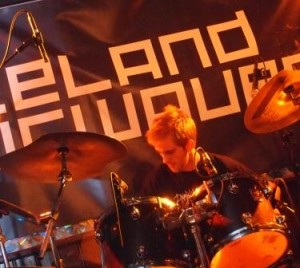 G: Raggi is also the drummer of Atrum, and you used to drum for Svartidauði?
G: Raggi is also the drummer of Atrum, and you used to drum for Svartidauði?
R: Yeah, after their original drummer quit, I filled in for a few months. But our guitarist was in Ophidian I until 3 or 4 weeks ago. It’s probably official now that he quit.
G: Yeah, I think so. I don’t think we’re telling any secrets. If we are, then, oops.
R: I have a little side project that’s turning into a full blown band called Azoic. It was just me and another guy, and now we are starting to rehearse as a full band. It’s more of a black metal thing.
G: It’s still some death metal. It’s really good stuff. I’m a big fan. I try to plug it whenever I can.
NCS: It seems like the bands around here plug each other a lot.
G: It helps everybody. I mean, it’s a small scene, so if one band is getting attention, it’s basically bringing attention to all the other bands.
R: Yeah, of course. If you are into death metal, you are bound to meet everybody in the scene in 3 or 4 concerts. We share a rehearsal space…
G: It’s us, Atrum, Angist, and Ophidian I, and now Azoic as well.
R: Aaah, not officially.
G: No, never. [laughing] I showed up early for one of our rehearsals recently; I walked into Azoic rehearsals. I just crashed on the sofa and listened to the music. And we played our last 3 or 4 shows with Angist. Edda has a great death metal voice, a really distinct death metal voice. Being a girl, it’s got a different sound to it. It’s extremely brutal, so amazing.
R: It doesn’t matter if she’s a girl. She has just a brutal voice.
G: And even outside of just death metal, Skálmöld is getting pretty big now, and it’s not uncommon to see them playing live with Beneath t-shirts or Brain Police or some other Icelandic bands.
R: When we go abroad, I only bring Icelandic band t-shirts to wear. Small things, but still, nobody’s gonna represent you for you, so we all have to help out. Maybe we’re seeing the start of a special brand. Hopefully people will know ‘Icelandic metal’ as a quality stamp.
G: I think the scene also is just a lot stronger than it has been in… well, probably ever. There was a big death metal scene back in, what? 1991-92, but I think quality-wise it is better today.
R: Much more international recognition. I think many of the bands have more fans from abroad than here.
G: Well of course there is the internet now. We didn’t have that in ‘92. It’s difficult to break out of Iceland. You can’t just jump into a van and drive around. It’s expensive, and also with us being that isolated, we don’t really have the connections in the States or mainland Europe.
R: It can be destructive because bands think, “Oh, we have to play for the same people over and over again.” But also it can be a little bit positive. Because you have to think, “If there’s going to be any chance that I get to play abroad, I really have to practice and make it as good as I can.”
NCS: What’s the response been to Enslaved by Fear?
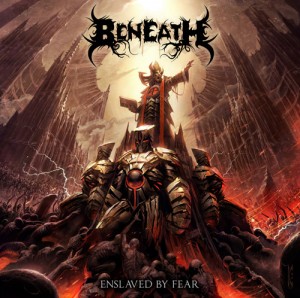 G: I still haven’t seen a negative review. Most of the reviews have been really good, and the comments from Facebook and YouTube.
G: I still haven’t seen a negative review. Most of the reviews have been really good, and the comments from Facebook and YouTube.
R: And we have to do an interview from time to time. We never had to do that before.
G: Our EP was released on Mordbrann Musikk. It was basically one guy. Our EP was the first release on that label and unfortunately the last as well, since the guy passed away. That was a really tiny, tiny label. So the big difference now is Unique Leader has a worldwide distribution.
NCS: I met a label owner last week who said labels are primarily useful for distribution.
G: I think that’s what we are getting out of it, mostly. They’re not putting up a lot of money in general. I don’t think people are really getting rich off album sales.
R: You can maybe break even on a tour if you sell enough merchandise.
G: Yeah, exactly. You basically release albums to sell t-shirts.
R: You’re not gonna support your family until you’re, like, Dimmu Borgir or something.
NCS: You don’t make a living off it, so how do you make the time?
R: You just have to make it into a lifestyle just like any other – it’s a hobby, but it’s not really a hobby. It’s much more.
G: It basically has to happen outside of working hours. I mean, we’re all either in school or working. We rehearse during evenings and weekends, and if you’re playing, that’s something else.
R: We just all like to play music. It’s the best thing we do, so it’s not really a problem [to make time].
NCS: How about touring?
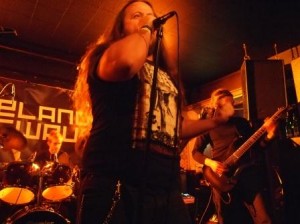 G: Well, we haven’t really had any real tours yet. We’ve gone abroad a few times. We haven’t had any release out to support until now. We’re looking for touring options for spring. So hopefully something comes out of that.
G: Well, we haven’t really had any real tours yet. We’ve gone abroad a few times. We haven’t had any release out to support until now. We’re looking for touring options for spring. So hopefully something comes out of that.
NCS: What have you been up to since July?
G: Working on the next album.
R: Yeah, we recorded the drums for this one almost three years ago, so we have had a lot of time to think.
G: The album has basically been ready for at least two years before it was released.
R: Just sitting on our hard drives.
G: We did the album before we signed with Unique Leader. We probably could have done things to speed things up. We will next time because we learned from a few mistakes. The art took us a long time, and then we had to fit into a release schedule. So a lot of things put the album back.
R: We’re just generally working on expanding everything. I mean, we bought better live gear and are writing new material. One of our guitarists, he moved abroad. So we had to deal with that a little bit.
NCS: Who moved abroad?
G: Jóhann [Ingi Sigurðsson].
R: He moved to Sweden.
G: So that of course complicates things a bit.
NCS: Is he still in Beneath?
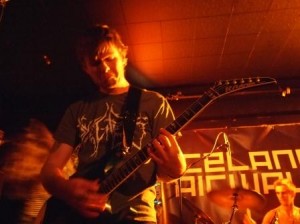 G: He is coming tomorrow for the [Airwaves] gig on Friday. He writes a lot of stuff, and he’s a big part of the sound. I mean, he recorded our EP completely; mixed it, mastered it.
G: He is coming tomorrow for the [Airwaves] gig on Friday. He writes a lot of stuff, and he’s a big part of the sound. I mean, he recorded our EP completely; mixed it, mastered it.
R: He has his own studio.
G: And the album, he recorded some drums, and also the guitars, bass, and vocals.
NCS: How do you write with the guitar player in Sweden?
R: There’s no primary writer, as opposed to my other bands. With Beneath, it’s everybody does everything. I’ve even written some songs for guitar.
G: It doesn’t matter who brings the ideas.
R: Usually we’re working on 2 or 3 songs at the same time. Maybe this one has 2 minutes; and sometimes we have been struggling with 2 or 3 songs for a long time and just mix them into one song. We have songs that have been written only by this guy, and other songs that have riffs from everybody. It varies a lot.
G: It’s definitely a band effort. Now, since Jóhann moved abroad, we are writing more individually, bringing more finished ideas to rehearsals.
R: We have weekly meetings on Skype to discuss band matters. He just records videos and audio at home and sends through Dropbox.
G: We try to use the internet as much as we can, but of course it just slows things down having somebody in another country.
R: It’s hard. He gets an idea and he can’t just bring it to practice the same night. But since we’ve had so much time, it doesn’t matter.
G: No, exactly. We have quite a lot of material we’ve been working on.
R: We have almost 4 songs finished, or at least a skeleton.
G: I think we have actually more that we just need to go through.
R: We’re gonna be starting preproduction hopefully this spring.
NCS: The same time you’re going to be touring?
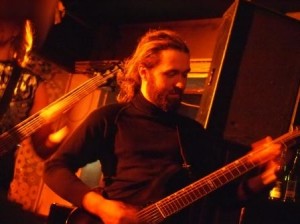 R: Hopefully. If we’ll be touring, then we’ll try to make some time for that.
R: Hopefully. If we’ll be touring, then we’ll try to make some time for that.
G: Try to fit it in. The preproduction demos we’ll just record on our own. It’s not like we’re going in to do everything in one session. It’s something that we’ll just gradually do.
R: Nothing gets done except everybody’s happy about it.
G: There should be no compromises with the music. If somebody doesn’t like something, we just skip it.
R: It’s usually not a problem. We all like fast and brutal.
G: Yeah, we are all pretty much on the same page.
R: The only thing I’ve heard is like, “It needs to be a little faster.” [both laugh] If it’s not entirely good enough, just play it a little bit faster and that usually does the trick.
NCS: So when can we expect the next one?
R: It’ll probably just depend on when the label wants it. If we had to finish it by April, we could do it. But of course it’s better to have more time. For the last album we were really rushing everything. We wrote two songs in the last two days before we went into the studio. We recorded the drums in 2 days – under 20 hours. I really hope we can have much more time for everything.
G: [chuckling] I don’t think so. You could do it last time in 20 hours, now it’s just 20 hours.
R: I just couldn’t drive or do anything with my hands for the next 2 weeks.
G: We didn’t do any preproduction demos last time. Now we want to do some recordings first. You know, listen to the songs for a couple months before we decide, “Okay, we don’t want to change it.” I would say another album early 2014 at the latest. I would personally like to see it earlier, but it depends on a lot of things. We don’t want to sit on it three years again.
NCS: What can we expect from the new stuff?
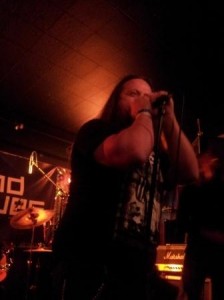 R: There are certain elements that we will cling onto. We always try to write structural songs, not just riff after riff. We try to have repetitions and make it into one song.
R: There are certain elements that we will cling onto. We always try to write structural songs, not just riff after riff. We try to have repetitions and make it into one song.
G: The song has to make sense. I mean, we’re still fast death metal. That hasn’t changed. I think the new material is maybe more diverse.
R: It’s a very hard question because we’re still writing it, you know.
G: It’s not like we’re just trying to play pure death metal. I think we are a death metal band that likes a lot of other stuff. I mean, we like black metal, and we like some hardcore or grindcore, some doom metal.
R: Yeah and other things than metal too. I know you’ve all been listening to Sigur Rós; can’t deny it.
G: No, I don’t think anybody in the band likes Sigur Rós, actually. Does anyone?
R: You don’t? I thought you were like a Sigur Rós guy.
G: I hate it. I mean, good for them, but I don’t like it.
R: I can relate. I like their studio, though.
G: Their studio’s great. We recorded drums for the album in Sigur Rós’ studio. Okay. That part I like about Sigur Rós, they have a good studio.
NCS: You mentioned touring in spring, but I’m sure the U.S. is not an option.
R: We would love to play there. I played once there. It was awesome. But, I mean, for us for touring is always harder. The sad truth is much fewer people would show up for shows until you’re a really big band.
G: I don’t think we would be touring as a headliner anyway, so it just depends on the options. It is a bit more expensive for us to go to the States, but it’s expensive to go to Europe anyways. So I think we’re all open to the idea of touring the States. It’s something we definitely want to do.
NCS: Any thoughts about Airwaves this year?
G: I want to see Swans.
R: I was just at my rehearsal space lending them my drum kit. But the guys picking up the kit were telling me they will know tomorrow if they’ll be able to make it here because of the weather. They weren’t smiling.
NCS: Oh right, because Sandy cancelled all the flights out of JFK today.
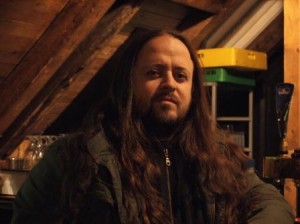 G: Your drum kit is not there. We have a rehearsal tomorrow. Are you using Tumi’s kit?
G: Your drum kit is not there. We have a rehearsal tomorrow. Are you using Tumi’s kit?
R: Aaah, maybe.
NCS: Not officially.
R: No no, I’ll always ask. I never put my fingers into something without asking.
NCS: So if Swans makes it, they’ll be playing your drums.
G: His kit is more famous than he is.
NCS: I’ve been told that for 300 bands in Iceland, there are 100 drummers, and 30 that are actually any good.
G: And out of 30 good drummers, there’s only one that can play 280 bpm on a regular basis and we have that guy.
R: It only goes one way, “Maybe a little bit faster.” It’s never like, “Oh, it should be slower.” I try to just stay at this tempo and don’t mention anything. They’ll want to eventually bring it up and I’ll have to rehearse more.
G: Bands that you should see – HAM, definitely. They are an Icelandic rock institution really; it’s a great band, probably my favorite Icelandic band. Probably going to see Dimma. That vocalist is probably the best heavy metal vocalist in Iceland today.
R: I didn’t check them out at last Eistnaflug…
NCS: Eistnaflug– is that festival growing like Airwaves?
G: It’s not that big. You have something like 1000 people there every year.
R: They said, “We can have it like a really big festival, or we can have it like this cozy, homey feeling.” So they limited the ticket number. The morale is just unique, no problems with anybody. If there’s somebody that gets the idea he wants to pick a fight or something, people just unite to throw him out of the camp.
G: You have all the bands mingling around; even the foreign bands. If you’re into metal, that’s your festival in Iceland.
NCS: So you’re playing only one show at Airwaves?
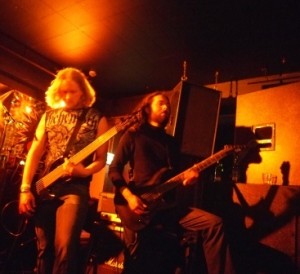 R: I’m playing with Atrum. Yeah, and another guy from Atrum is playing like 3 shows.
R: I’m playing with Atrum. Yeah, and another guy from Atrum is playing like 3 shows.
G: He’s playing in Momentum as well. Momentum is a strange band; great guys, good friends of ours. Back in 2004, something like that, they were an awesome death metal band.
R: Aw man, they were like my idols. They were the only ones doing anything fast.
G: Now, I don’t understand what they’re playing; some experimental Neurosis meets Mastodon…
R: I can understand it. I think it’s really cool.
G: Yeah, it’s a really good band, I just don’t get it. How do you get from that death metal band to a kinda experimental post-something?
R: I never understood why they weren’t signed.
G: Three bands that should be signed; Momentum, Gone Postal, and Atrum. Gone Postal started as a death metal band. They’re kind of black metal now. But those three bands I don’t understand why. Well, I know why Atrum are unsigned; because nobody sends out any promos.
R: Yeah, well, I just want to play drums.

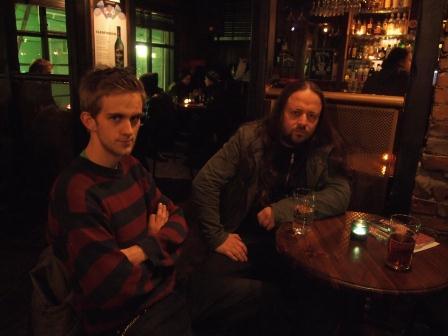
My first thought – ‘Hey, I’ve been drinking in that pub… I remember it has an outside beer garden area. And also, that when the sun doesn’t set… you spend a lot more time drinking outside than you intended to.’